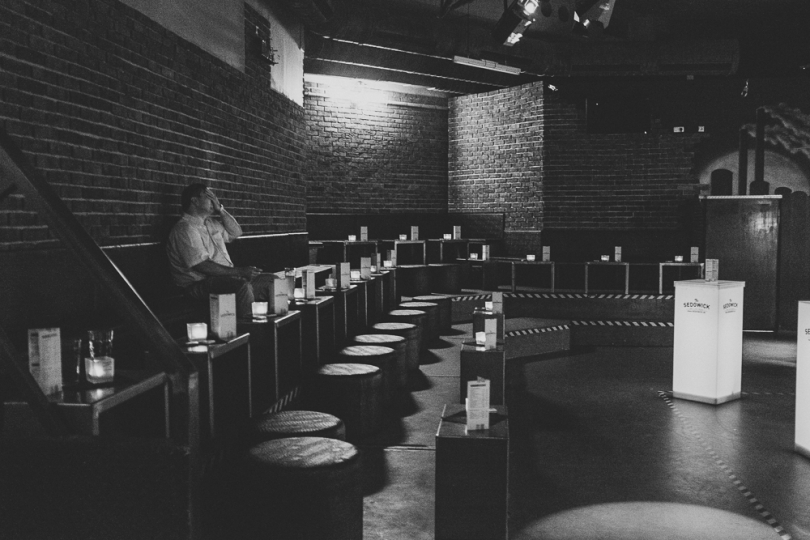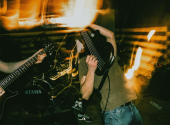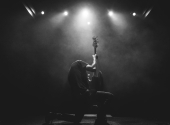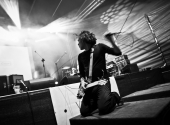
5 Tips on How to Deal with an Empty Venue
Sometimes it happens to the best of us – no one turns up to your concert. Half of the audience fell ill with a cold, others decided to go to a concert of a big international star who performs in your region once a year and you didn't notice the date when you were planning, and the rest just stayed at home watching TV. Five minutes after the scheduled start of the concert, there are a few of your most faithful fans in the venue, the sound engineer, a random passer-by, a regular from the local bar to whom you promised a beer and the drummer's mum. But that doesn't mean you should pack up and escape through the back door. The following five strategic tips aim to lift your band's spirits when you have to face the music in an empty concert hall.
1. Find an alternative source of energy
Leaving aside various stimulants, whose health benefits are questionable and their effect is temporary, nothing energises a person as much as an enthusiastic audience. The energy flowing from the venue can be easily absorbed and sent back through the music. But how to cope when the hall is deserted and instead of frenetic applause and shouting, only specks of dust illuminated by spotlights, nervous anticipation and muffled conversation of those few loyal listeners and your own echoing voice carry through the venue?
Try an individual approach. Choose one of the few spectators or someone from your band and dedicate the entire concert to that person. Alternatively, create a fictional recipient of your musical feelings that you imagine hidden somewhere in the darkness of the hall. You can also trick the musician's anxious mind with a theatrical trick – cling to any inanimate object in the room, into which you pump your creative energy. Or give up the idea of performing outwards, turn your attention inwards to your head and play with all the vigour you can muster just for yourself.
In short, think of a mental trick to prevent your brain from falling into melancholy and playing the concert morosely, wondering why people didn't show up and what you're doing wrong. Save the debates about the reasons for the low turnout for the backstage or the band van.
2. Pretend it's crowded
Even if you feel like bouncing around the stage over an empty floor is awkward and ridiculous, use whatever resources mentioned in point #1 and give the few people who did show up a full concert experience. Sure, you don't have to force yourself into headbanging and your wildest dance creations that you usually perform in front of a vibrant crowd if it doesn't feel natural (although that kind of stage diving would be truly memorable...)
At the same time, just because those few listeners are shyly shuffling around somewhere in the darkness of the venue, you don't have to stand stock still on the stage. Moving around will make you feel good, help your head relax and have a positive effect on the people around you. Also, avoid defeatist nonverbal gestures, don't skimp solos and communicate between songs. All you can get is applause and appreciation for your professional approach.
3. Embrace the emptiness
Different things suit different people. For example, if you like irony and are used to dealing with uncomfortable situations with sarcastic humour, or if you don't like pretending and cannot act as if you didn't even notice the low audience turnout, you can try to actively work with the "empty hall" theme throughout the evening. While it's no good drawing attention to your loneliness after every song and putting yourself down in a subconscious effort to garner support, a few jokes and lighthearted remarks can help bridge the gap between you and the audience and relieve everyone from feeling overexposed. When you combine it with musical professionalism (see point 2), you show that you are on top of things and don't get caught up in the situation... which is all the more appreciated.
If the venue is large and your stage plan is moderate, you can also get off the stage and approach your modest audience – maybe they will approach you too.
4. Do a dress rehearsal on stage
In such a challenging situation, you can try to lift the band's spirits by deliberately treating the evening as a public dress rehearsal for the next concert (which will definitely be much better and more satisfying in terms of the size of the audience). You'll do everything as usual and with full commitment, but you'll look at the event differently. Thus, you will take at least some of the weight and bad feeling off your shoulders – after all, it is a rehearsal, albeit a public one.
This means that you will try to play well, not miss your cues and test stage choreography, band communication and sound (ignoring the echo in the empty hall knowing that "it will be different when there are people"). Unlike a concert, the "dress rehearsal" setup allows you to communicate a little better with the sound engineer, at the same time you won't be rehearsing cues or fragments of songs as you do in the rehearsal room. You won't be pretending, but you will play "for real". As a result, you might appear more relaxed and the few people who have arrived will spread the word about how well you did and that they enjoyed your concert.
5. Strengthen relationships in the band
When the venue is packed, you have to divide your attention between the people in the audience and the band. You might watch the guy on the left under the stage jumping around and digging your music, while at the same time, you concentrate on your own playing – you need to focus on the cues, form and dynamics, adjust your solos to the mood of the moment while using some of the tried and tested techniques. At the same time, you keep an eye on the other players and try to follow their nonverbal gestures and create one sound, one common experience that will only exist in that one moment and will never be the same again.
When the concert hall is empty, you do the same thing, but you have the unique opportunity not to watch the jumping people and instead concentrate on the interaction with others in a full concert setting. Even if you pay for the venue rental yourselves, this experience is worthwhile and will prove beneficial in the future. And the fact that you and the others successfully survived the unpleasant musicians-to-listeners ratio can only strengthen your band relationships. Just please don't argue in the van about who the hell is to blame for the empty room. Sometimes it's just fate and it's nobody's fault.
If you have found an error or typo in the article, please let us know by e-mail info@insounder.org.





